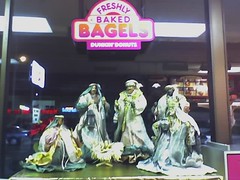Dissection time: Michael Powell's Op-Ed
Let's start with the headline—"Don't Expect the Government to be a V-Chip"—which a contributor would not be responsible for writing, of course. The headling presents the piece inaccurately, suggesting that it's an admonition aimed at the nitwits who actually get offended about the ocassional tit on prime time TV. Damned if that wouldn't be refreshing. What this piece actually says, to borrow a phrase from Bill Hicks, is: "Go back to bed, America."
Powell apparently wants to convince us he's our buddy. "Time to take a deep breath," he begins, because as a government official he has an interest in gently discouraging public criticism of his performance. Way to play a nice neutral role. Balancing control and freedom in the area of expression will necessarily involve making subjective and moralistic judgments. Being FCC chairman will involve compromising either your own credibility or the First Amendment, and most people are willing to accept the latter. Guess what's gonna happen? This is why his position should not even exist in its current form, or at least why Powell shouldn't be in it.
"It is no surprise that those who make a handsome living by selling saucy fare rant the loudest - it drives up the ratings." This is true. And there will always be hucksters taking advantage of good things. Powell, however, seems to want to convince readers that only greed motivates people to advocate a broader definition of free speech. The networks are not the only ones who would benefit from looser restrictions. Historically, the gradual loosening and refining of (poorly founded) speech restrictions has made way for valuable literature, art, film and journalism. Powell wants you to think that it's time for that particular horizon to stop expanding, that speech is "free enough."
The article's will-of-the-people rhetoric hints at how scary things can get under a right-wing government with majority support. ". As one deeply suspicious of government involvement in the regulation of content, I understand and often agree with those who stand up for the cherished value of free speech." Fair enough, but that's nice and abstract principle-talk, and principles tend to be flexible. "But as a parent, I respect the desire of the American people for a minimum level of decency on the public airwaves - particularly where their children are concerned." (1) Appeal to the immediate problem in a simple way, understandable to simple people, and those principles get quite flexible indeed.
(2) Children may be exposed to some things most people wouldn't want them to be exposed to. Often they seek it out themselves. They'll live. Hell, they might even benefit from it, unless their parents have so much stupidity to spare that it overflows onto them.
Powell considers it one of the FCC's merits that "we rely on public complaints." Again, that's a bad idea. Many people in this country hold principles too crazy, too fundamentalist, too religious and too moralistic to be consistent with Constitutional values, and they won't hesitate at the opportunity to force those principles upon others. These often happen to be the people who claim to be especially proud to live in a "free country." They obviously have no idea how insane they are, and therefore should not have any influence upon government regulation of speech.
"In recent years, complaints about television and radio broadcasts have skyrocketed, and the F.C.C. has stepped up its enforcement in response." This is why we need courts—government agencies often tend to conspire with idiot mobs. But as Powell notes, the Supreme Court and lower federal courts tend to be compliant when it comes to speech regulation. A cursory reading of important obscenity cases like Roth v. United States(1957) makes it obvious that obscenity precedent has no basis in the Constitution, but rather in the implicit attitude that the courts must appease the moral sense of the public. The Roth standard for obscenity: "Whether, to the average person, applying contemporary community standards, the dominant theme of the material, taken as a whole, appeals to prurient interest." Well, to borrow again from Bill Hicks, having a dick appeals to prurient interest. The details of obscenity standards have changed in subsequent cases, but the Roth test more or less still applies.
"Obscenity" includes, almost exclusively, depictions of or reference to sex or excretion—both healthy, natural functions. No one's ever been fined for attempting to pollute our heads by broadcasting sick fundamentalist drivel, which is really more damaging and less socially valuable on the whole.
Powell closes up with the reminder that he's being careful about striking a "delicate First Amendment balance." We can talk principle as much as we want, but that won't stop us from backsliding.


0 Comments:
Post a Comment
<< Home